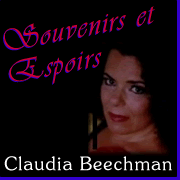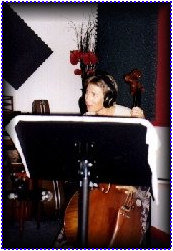

| |
||||
![]()
| (note- sound clips are in Real Audio
format; Download Real
Player to listen to them, if it is not already installed on your
computer) |
|
| |
 |
![]()

|
Souvenirs et Espoirs is available at CD Baby. Also visit this page for sound clips and more information. |
![]()
 I've
collected the songs on this album during the last twenty years. I
learned LA VIE EN ROSE on the guitar in the
early 70's. I was still doing folk music then, but I found that
as long as I could do LA VIE EN ROSE, I'd get
a gig somewhere. The most recent edition, MES
JEUNES ANNÉES, came to me fortuitously. I had heard
the song but I couldn't find the sheet music. Then my parents took
a trip to France and stayed with a choir director who gave it to them.
It's my favorite on the album. I was so moved I had to add
my own English lyrics. I became enraptured with dramatic numbers
like L'ACCORDÉONISTE, MON
LÉGIONNAIRE and NON, JE NE REGRETTE RIEN
after listening to The Edith Piaf Deluxe Set, a gift from my father
upon my return to Philadelphia after living in Paris. As for Jacques Brel,
I had always loved his music. In the 70's, I was singing in a club
in Philadelphia when Shay Duffin, an actor and director, heard me. A
few months later, he called and asked me to do a Canadian production of
Jacques Brel is Alive and Well and Living in Paris. Although
not from the show, the plaintive NE ME QUITTE PAS
is probably Brel's best known song in the U.S. My first accompanist,
an erstwhile French professor, introduced me to several other songs on
this album. SYRACUSE, written in 1962,
was a big Montand hit. Most people think of Paris as the city
of dreams, but in this song, a Parisian muses on the exotic places he'd
like to see- Easter Island, the Gardens of Babylon- before he grows old.
He also made me learn the lilting SUR LES QUAIS
DU VIEUX PARIS and UN JOUR TU VERRAS,
which is from a film called Les Secrets D'Alcove, which one of
my French dictionaries translates as "Marital Intimacies." The prolific
French singer and composer
I've
collected the songs on this album during the last twenty years. I
learned LA VIE EN ROSE on the guitar in the
early 70's. I was still doing folk music then, but I found that
as long as I could do LA VIE EN ROSE, I'd get
a gig somewhere. The most recent edition, MES
JEUNES ANNÉES, came to me fortuitously. I had heard
the song but I couldn't find the sheet music. Then my parents took
a trip to France and stayed with a choir director who gave it to them.
It's my favorite on the album. I was so moved I had to add
my own English lyrics. I became enraptured with dramatic numbers
like L'ACCORDÉONISTE, MON
LÉGIONNAIRE and NON, JE NE REGRETTE RIEN
after listening to The Edith Piaf Deluxe Set, a gift from my father
upon my return to Philadelphia after living in Paris. As for Jacques Brel,
I had always loved his music. In the 70's, I was singing in a club
in Philadelphia when Shay Duffin, an actor and director, heard me. A
few months later, he called and asked me to do a Canadian production of
Jacques Brel is Alive and Well and Living in Paris. Although
not from the show, the plaintive NE ME QUITTE PAS
is probably Brel's best known song in the U.S. My first accompanist,
an erstwhile French professor, introduced me to several other songs on
this album. SYRACUSE, written in 1962,
was a big Montand hit. Most people think of Paris as the city
of dreams, but in this song, a Parisian muses on the exotic places he'd
like to see- Easter Island, the Gardens of Babylon- before he grows old.
He also made me learn the lilting SUR LES QUAIS
DU VIEUX PARIS and UN JOUR TU VERRAS,
which is from a film called Les Secrets D'Alcove, which one of
my French dictionaries translates as "Marital Intimacies." The prolific
French singer and composer  Charles
Trenet is represented by three songs. Bruce Coyle and I decided
to do his best known song, QUE RESTE-T-IL DE NOS AMOURS
("I Wish You Love") in both English and French. VOUS
QUI PASSEZ SANS ME VOIR, less well-known in this country, also
speaks of unrequited love. In MES JEUNES ANNÉES,
Trenet recalls his childhood in the Pyrenees. PARLEZ-MOI
D'AMOUR, an international hit written in 1930, was made popular
by the beautiful Parisian chanteuse and cabaret owner, Lucienne Boyer.
HARMONIE DU SOIR comes from Leo Ferre's
album Ferre Chante Baudelaire. Most of these songs are part of
my cabaret act. During a rehearsal, Bruce commented that he kept
hearing a cello behind my voice. Nancy, a friend since childhood,
agreed to bring her artistry to this CD.
Charles
Trenet is represented by three songs. Bruce Coyle and I decided
to do his best known song, QUE RESTE-T-IL DE NOS AMOURS
("I Wish You Love") in both English and French. VOUS
QUI PASSEZ SANS ME VOIR, less well-known in this country, also
speaks of unrequited love. In MES JEUNES ANNÉES,
Trenet recalls his childhood in the Pyrenees. PARLEZ-MOI
D'AMOUR, an international hit written in 1930, was made popular
by the beautiful Parisian chanteuse and cabaret owner, Lucienne Boyer.
HARMONIE DU SOIR comes from Leo Ferre's
album Ferre Chante Baudelaire. Most of these songs are part of
my cabaret act. During a rehearsal, Bruce commented that he kept
hearing a cello behind my voice. Nancy, a friend since childhood,
agreed to bring her artistry to this CD.
![]() This
page last updated: Feb.
5, 2004
This
page last updated: Feb.
5, 2004
Contact Claudia or the webmaster
with any questions or comments.